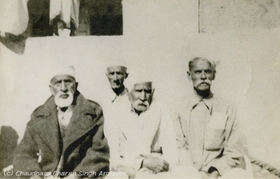Mir Singh, a young, talented, and hardworking farmer, successfully transformed the leased agricultural land. However, the landowner decided to sell the land at a high price, which Mir Singh could not afford despite his hard work. As a result, Mir Singh had to leave the land. He moved to the clan village of Bhoopgarhi, situated 60 km north, with his young son Charan Singh, where the family resided until 1922. Meanwhile, Mir Singh's brother relocated to another clan village, Bhadaula, which was 20 km south. Charan Singh received his primary education in Jani Khurd, located two kilometers from Bhoopgarhi, where he attended school daily. At home, he participated in household chores and engaged in activities typical of a village child, such as cutting fodder for the animals and playing kabaddi. Due to limited capacity, Charan Singh had to attend the Moral Training School in Meerut, which was 15 km away, for a year. Subsequently, he enrolled in Government College, Meerut in 1914. In the ninth grade, he chose science as his subject and also displayed interest in English, economics, and history. The influential personalities and movements of Swami Dayanand Saraswati and Mahatma Gandhi equally impacted the young Charan Singh.
Charan Singh completed his high school education in 1919 and passed his intermediate examination in 1921. He was profoundly influenced by Maithili Sharan Gupt's poem "Bharat Bharti," a powerful Hindu nationalist poem, and the 'Jallianwala Bagh' incident that took place in Amritsar in April 1919. Uncle Lakhpat Singh held a special fondness for the studious and promising Charan Singh. He recognized that financial difficulties might hinder his nephew's studies and vowed to cover the expenses of Charan Singh's education until its completion.


